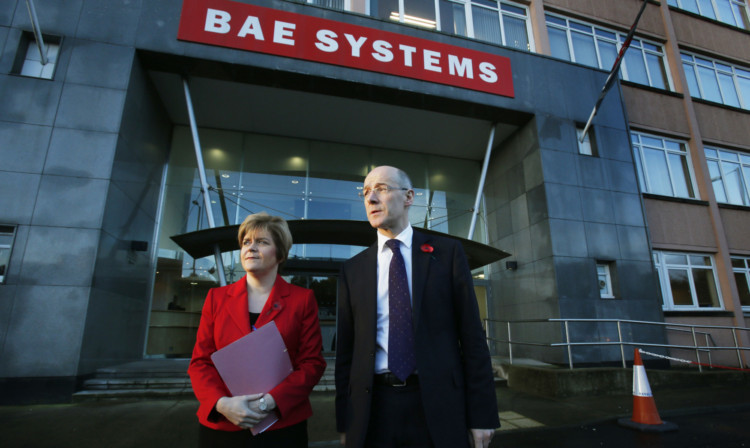The Deputy First Minister and Finance Secretary say they have held constructive discussions with BAE Systems directors and union officials about the hundreds of shipbuilding job losses announced by the firm this week.
Nicola Sturgeon said the aim of the meeting was to discuss how the Scottish Government can help those set to lose their job, such as by helping with retraining and finding other employment.
BAE said a total of 1,775 workers will lose their job, with 835 redundancies in Glasgow, Rosyth and Filton, near Bristol, and the remaining 940 in Portsmouth.
More detail about the job losses is expected to emerge from talks between the company and unions early next week.
Ms Sturgeon said there is demand for the Clyde shipbuilding workers’ skills in other sectors, and that the Scottish Government is keen to help their skills be transferred.
“This is a highly skilled workforce and one of the things we’re keen to stress, as is the company and the trade unions, is that there are other companies, other organisations out there, that have a demand for the kind of skills that we will see affected here, so we want to make sure that we’re doing everything we can to bring the supply of skills and the demand for them together,” she said.
“Clearly we’ll see more detail emerge over the course of next week about the breakdown of the announcement and the profile of the redundancies that are likely to be faced, but the Scottish Government has very well-established arrangements to help people in these circumstances and we want to make sure that they dovetail with what the company is planning so that people get access to the support that they need at what is an extremely difficult time.
“Eight hundred job losses in any context is a significant blow and we need to make sure that people have the support required.”
Finance Secretary John Swinney, who attended the meeting at BAE’s Scotstoun yard in Glasgow with Ms Sturgeon, said there might be opportunities in renewables or the oil and gas industry for some of the Clyde workforce.
Shipbuilding at Portsmouth will be stopped in the second half of next year but the Clyde yards have been earmarked to build type-26 warships.
But Scottish Secretary Alistair Carmichael has suggested that Portsmouth is “well placed” for the contract in the event of Scottish independence.
Speaking after meeting management and unions at the Clyde yards yesterday, Mr Carmichael said the Scottish Government has questions to answer about shipbuilding if Scotland votes Yes in next year’s referendum.
“It is simply rash to say over 2,000 skilled Scottish jobs would be better served by the vague hope of future collaboration and joint procurement when, in the here and now as part of the UK, we are providing certainty for the industry and the many livelihoods which depend on it,” he said.
“There is a double standard at the heart of their position. On the one hand they say an independent Scotland would build Scottish Navy ships here and nowhere else. On the other, they expect the UK, which they would like to leave, not to follow the same path.”
Ms Sturgeon insists that warships could be built in Scotland even if the country leaves the UK.
“I think the Clyde is the best place to build the type-26 frigates we are talking about and I think that is the case regardless of the referendum next year. The skills, the depth and the breadth of the skills here on the Clyde, the investment that we’ve seen in the yards over the years makes the Clyde the best place to build these ships,” she said.
“That’s got to be what we all focus on. The debate around the referendum will be hard fought over the next number of months but, regardless of what side of the debate anybody is on, we should all be uniting to say the Clyde is the best place to build these kind of ships and we want to ensure that it has a strong future.”
Meanwhile Labour leader Ed Miliband refused to offer a jobs guarantee to Clyde shipyard workers in the event of Scottish independence during a visit to Edinburgh on Thursday.
